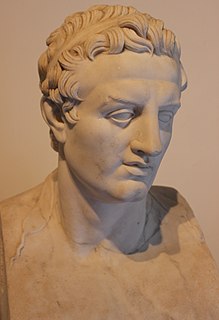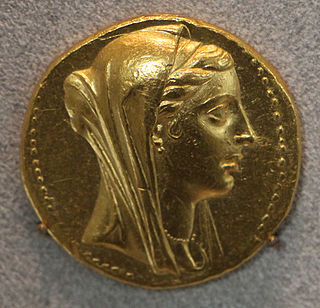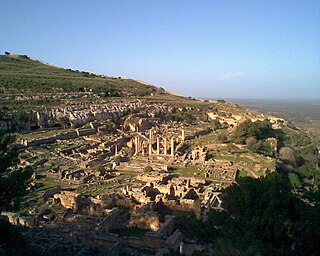Related Research Articles

Eratosthenes of Cyrene was a Greek polymath: a mathematician, geographer, poet, astronomer, and music theorist. He was a man of learning, becoming the chief librarian at the Library of Alexandria. His work is comparable to what is now known as the study of geography, and he introduced some of the terminology still used today.

Ptolemy III Euergetes was the third pharaoh of the Ptolemaic dynasty in Egypt from 246 to 222 BC. The Ptolemaic Kingdom reached the height of its military and economic power during his kingship, as initiated by his father Ptolemy II Philadelphus.

Berenice I was Queen of Egypt by marriage to Ptolemy I Soter. She became the second queen, after Eurydice, of the Ptolemaic dynasty of Egypt.

Berenice II Euergetis was ruling queen of Cyrenaica from around 250 BC and queen and co-regent of Ptolemaic Egypt from 246 BC to 222 BC as the wife of Ptolemy III Euergetes.
Berenice is the Ancient Macedonian form of the Attic Greek name Φερενίκη Pherenikē, which means "bearer of victory" from Ancient Greek φέρω (pherō) 'to bear', and νίκη (nikē) 'victory'. Berenika, priestess of Demeter in Lete ca. 350 BC, is the oldest epigraphical evidence. The name also has the form Bernice.

Cyrene was an ancient Greek and later Roman city near present-day Shahhat, Libya. It was the oldest and most important of the five Greek cities, known as the pentapoleis, in the region. It gave eastern Libya the classical name Cyrenaica that it has retained to modern times. Located nearby is the ancient Necropolis of Cyrene. The traditional founder of the city was Battus the Lacedemonian, though the exact relationship between the fledgling city and other cities has led historians to question that narrative. Particularly, the idea that Thera was the sole "mother city" is disputed; and the relationship with other cities, such as Sparta and Samnium merchants, is unclear.

Antigonus III Doson was king of Macedon from 229 BC to 221 BC. He was a member of the Antigonid dynasty.

Magas of Cyrene was a Greek King of Cyrenaica. Through his mother’s second marriage to Ptolemy I he became a member of the Ptolemaic dynasty. He managed to wrest independence for Cyrenaica from the Greek Ptolemaic dynasty of Ancient Egypt, and became King of Cyrenaica from 276 BC to 250 BC.
Demetrius I the Fair or the Handsome, known in modern ancient historical sources as Demetrius of Cyrene, was a Hellenistic king of Cyrene, who succeeded Magas I.
Perictione was the mother of the Greek philosopher Plato.
Ladice or Ladice of Cyrene was a Greek Cyrenaean princess and was a member of the Battiad dynasty. She married the ancient Egyptian pharaoh Amasis II. When Amasis died in 526 BC, she returned from Egypt back to Cyrene.
Aristotle of Stagira was a Greek philosopher.
Polycrates of Argos, son of Mnasiades, was a Ptolemaic commander at the Battle of Raphia, as well as a governor of Cyprus and chancellor of the Ptolemaic Kingdom in the late third and early second centuries BC.
Apollophanes of Antioch was a Stoic philosopher. During his life, he left the Seleucid empire for Athens. There he became a pupil and friend of Aristo of Chios. As a student of Aristo, he may have call himself an Aristonian. There is some assertion that he is the same as Apollophanes the physician who lived at the court of Antiochus.
Zeuxo daughter of Polykrates of Argos won the harma polikon in the Panatenaia of 202 BC. Her sisters: Eukrateia and Hermione were also victorious at the same Panathenaia her father Polykrates and mother, also named Zeuxo, were victorious at the Panathenaia as well. Zeuxo was also victorious at the panathenaia in 182 BC.
Eukrateia, daughter of Polykrates of Argos, won synoris teleia in the Panathenaia of 202 BC. In the same year her sisters also won: Hermione with 4 horse chariot and Zeuxo with colt drawn chariot.
Hermione, daughter of Polykrates of Argos, won with keles teleion in the Panathenaia of 202 BC. In the same year her sisters also won: Eucrateia with harma teleion and Zeuxo with harma polikon.
References
- ↑ "Zeuxo daughter of Ariston from Kyrene (Kyrenaika)". Connected contests: Ancient athletes online.